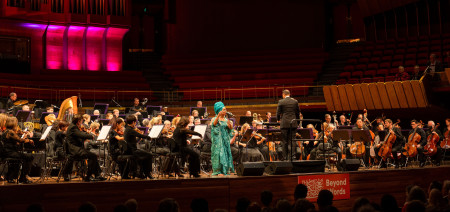
From Wellington’s concert at Michael Fowler Centre Photo credit: Latitude Creative
In a stirring tribute to peace and unity, The New Zealand Symphony Orchestra Te Tira Pūoro o Aotearoa (NZSO), in collaboration with The Central Iqra Trust, Muslim communities nationwide, and the Ministry for Ethnic Communities, recently presented "Beyond Words."
This symphonic expression took place a week prior to the 5th remembrance of the Christchurch Mosque terrorist attacks of March 15, 2019, with a series of concerts and engagement programmes.
Premiering in Christchurch and featured in the Aotearoa New Zealand Festival of the Arts and the Auckland Arts Festival Te Ahurei Toi o Tāmaki Makaurau, "Beyond Words" showcased a profound collaboration.
The project received funding from our Ethnic Communities Development Fund (ECDF), facilitating its realisation.

Simfunia Al Wihda: Islamic Performance and Workshop in Christchurch Left to right: Esmail Fathi, Liam Oliver, Abdelilah Rharrabti, Pragunya Myers-Daly, Waris Rajput, Nelson Myers-Daly Photo credit: Latitude Creative
The ECDF's funding helped organise the community engagement events that supported the concerts in each city. In addition, the funding ensured premium ticket access for the families of the victims and affected communities, fostering inclusivity and support.
Commenting on the collaboration with our Ministry, Shona Jaunas, Artistic Manager from NZSO said, "The Ministry went above and beyond, offering unwavering support and guidance to the NZSO in every aspect of the project. As a result of the close and collaborative working on Beyond Words, a powerful and enduring relationship between the two organisations has been fostered, a testament to the incredible impact that can be achieved through partnership."
Performed just ahead of Ramadan, "Beyond Words" featured the premiere of "Ahlan wa Sahlan," a composition by John Psathas, starring OUM (vocalist), and Kyriakos Tapakis (oud player). Conducted by the remarkable Fawzi Haimor.
The concert began with a heartfelt recitation of Surah Al-Fatiha (the Opener), setting a poignant tone for the evening.
Community engagement events preceding each concert introduced the audience to a variety of themes, including Islamic music workshops, Arabic language calligraphy, traditional Afghan dinners, and panel discussions with the musicians and community.

Our Ministry’s team with NZSO team and contributors to the ‘Beyond Words’ project - from the Christchurch pre-concert launch dinner.
Altogether, the performance and these events harmonised beautifully, echoing the concert's themes of peace and unity with resounding strength.

From Auckland’s concert
The concerts garnered significant attendance, with over 90% occupancy in Christchurch, 79% in Wellington, and 53% in Auckland, totalling an audience 3905. Additionally, community engagement events attracted over a thousand participants across the three cities.
The Feedback from organisers, participants, and audience members alike has been overwhelmingly positive, with praises for the concert's emotional resonance, cultural significance, and message of unity.
Communities felt empowered, connected and inspired.
The audience expressed profound emotions, with one attendee remarking, "Witnessing my religion and culture showcased on stage was an awe-inspiring experience, evoking an indescribable sense of pride and connection. The convergence of diverse audiences united under the common banner of 'peace' only magnified the significance of the moment, rendering it truly extraordinary. "
The concert also succeeded in reaching out to new audiences, with one saying, "I went to the show yesterday, and I cannot tell you how moved and affected I was. It was my first experience of a symphony orchestra, and I'm kicking myself for not going sooner."
Critics also lauded the performance, with The New Zealand Herald describing the key work, "Ahlan wa Sahlan," as "an ambitious and effective collaboration."

From Janna Ezat: A Journey through Arabic Calligraphy
"Beyond Words" is an example of the transformative power of art in creating understanding, healing wounds, and uniting communities in the face of adversity. As Ashraf Omar, a Christchurch Panel Speaker, said, "I don't feel like this is something that is being done to us or for us but with us."
